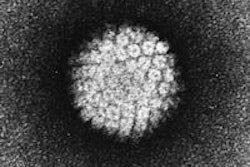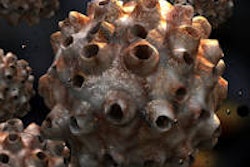A higher percentage of oropharyngeal cancers might be related to the human papillomavirus (HPV) than previously thought, and vaccines could prevent the disease, according to a new study by researchers from the U.S. Centers for Disease Control and Prevention (CDC).
The study investigated the prevalence of HPV types detected in oropharyngeal cancers in the U.S. population to establish a baseline for monitoring the impact of vaccination.
"Our finding of more than 70% of HPV prevalence in a large sample of the oropharyngeal cancer patients from around the United States suggests that a substantially higher faction may be HPV-related than has been reported in many previous investigations," the researchers wrote (Emerging Infectious Diseases, May 2014, Vol. 20:5, pp. 822-828).
Currently, the worldwide incidence of oropharyngeal cancers is estimated to be 85,000 annually, and every year in the U.S. about 12,000 new cases are diagnosed, which are usually classified as oropharyngeal squamous cell carcinoma (OPSCC).
The researchers found that 72% of the 557 patients with OPSCC were positive for HPV, and 62% were positive for HPV types 16 or 18 (HPV16/18). The prevalence of high-risk HPV16 and HPV18 was lower in women than in men (53% versus 66%), and lower in the non-Hispanic black group than other racial and ethnic groups (31% versus 68% to 80%).
Other high-risk types, including HPV31, 33, 35, 39, 45, and 52, were found at low frequencies, the researchers found.
Currently, two FDA-approved HPV vaccines are on the market: Gardasil and Cervarix.
Gardasil is effective against HPV 6, 11, 16, and 18, and has shown efficacy in preventing cervical, anal, and vaginal cancers, as well as genital warts. It is also the only HPV vaccine approved for males. Cervarix is a bivalent vaccine against HPV16 and HPV18.
The CDC currently recommends routine HPV vaccination for girls and boys ages 11 to 12 years, although the series of three shots can be started as young as age 9. Catch-up immunization is recommended to age 26 years for women and age 21 for men.
"This study supports a role for oncogenic HPV in high proportions of oropharyngeal cancers," the researchers concluded. "Results indicate that vaccines could prevent most oropharyngeal cancers in the United States, but their effect may vary by demographic variables."



















